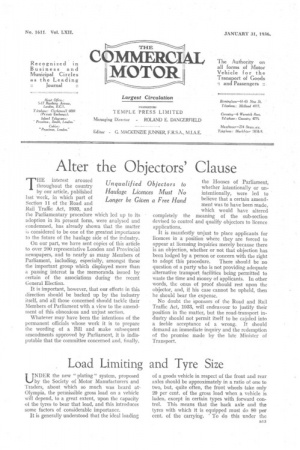Alter the Objectors' Clause
Page 23

If you've noticed an error in this article please click here to report it so we can fix it.
THE interest aroused throughout the country by our article, published last week, in which part of Section 11 of the Road and Rail Traffic Act, 1933, and the Parliamentary procedure which led up to its adoption in its present form, were analysed and condemned, has already shown that the matter ii considered to be one of the greatest importance to the future of the haulage side of the industry.
On our part, we have sent copies of this article to over 200 representative London and Provincial newspapers, and to nearly, as many Members of Parliament, including, especially, amongst these the 'important group which displayed more than a passing interest in the memoranda issued by certain of the associations during the recent General Election.
It is important, however, that our efforts in this direction should be backed up by the industry itself, and all those concerned should tackle their Members of Parliament with a view to the amendment of this obnoxious and unjust section.
Whatever may have been the intentions of the permanent officials whose work it is to prepare the wording of a Bill and make subsequent amendments approved by Parliament, it is indisputable that the committee concerned and, finally, the Houses of Parliament, whether intentionally or unintentionally, were led to believe that a certain amendment was to have been made, which would have altered completely the meaning of the sub-section devised to control and qualify objectors to licence applications.
It is manifestly unjust to place applicants for licences in a position where they are forced to appear at licensing inquiries merely because there is an objection, whether or not that objection has been lodged by a person or concern with the right to adopt this procedure. There should be no question of a party who is not providing adequate alternative transport facilities being permitted to waste the time and Money of applicants. In other words, the onus of proof should rest upon the objector, and, if his case cannot be upheld, then he should bear the expense.
No doubt the 'sponsors of the Road and Rail Traffic Act, 1933, will endeavour to justify their position in the matter, but the road-transport industry should not permit itself to be cajoled into a feeble acceptance of a wrong. It should demand an immediate inquiry and the redemption of the promise made by the late Minister of Transport.




















































































